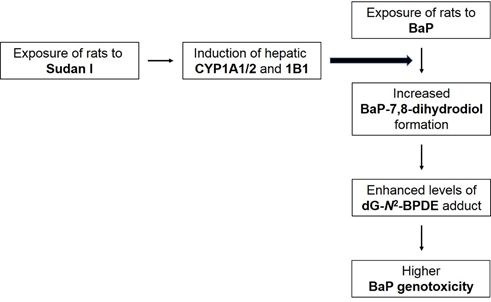WHY AVOID EATING GRILLED MEAT WITH IMPORTED CHILI SAUCE?
The well-known polycyclic aromatic hydrocarbon benzo[a]pyrene is a proven human carcinogen to which humans are almost inevitably exposed in their environment as it can be found in food either processed at high temperatures or grown in contaminated soils, in air polluted by diesel exhaust, and also in tobacco smoke. Because modern civilisation is almost constantly exposed to several harmful substances concurrently, one environmental carcinogen might affect the potency of another carcinogen when humans are co-exposed to both.
This summer, our research group from the Laboratory of Molecular Carcinogenesis and Drug Development published an article in the special issue Food Toxicants of the International Journal of Molecular Sciences entitled "Benzo[a]pyrene-Induced Genotoxicity in Rats is Affected by Co-Exposure to Sudan I by Altering the Expression of Biotransformation Enzymes” (https://doi.org/10.3390/ijms22158062), which deals with the effect of the joint action of two carcinogenic substances on the genotoxic potential of one of them, namely benzo[a]pyrene. Therefore, in our in vivo study, rats as a mammalian model were co-exposed in addition to benzo[a]pyrene also to the orange azo dye Sudan I, which is primarily used to colour materials such as hydrocarbon solvents, oils, waxes, plastics, inks and shoe and floor polishes. However, it has also been found in a variety of chili, curry, and tomato sauces and flavourings, to which it gives a "better" colour. As Sudan I is considered a potential human carcinogen, its use in the food industry has been prohibited in the European Union. However, its use for this purpose has still not been completely abandoned in some Asian countries.
In this project, we benefited from decades of research that was done by prof. Marie Stiborová and her colaboratores. We investigated how co-exposure of rats to benzo[a]pyrene and Sudan I, toxic substances that may also be present in food, affects the expression of enzymes metabolizing benzo[a]pyrene to elucidate the role of cytochrome P450 1A1 in the genotoxic potential of benzo[a]pyrene. We wondered whether the induction of cytochrome P450 1A1 catalysing the oxidation of benzo[a]pyrene preferentially leads to its detoxification or activation in vivo. According to our findings, Sudan I administrated to rats prior to benzo[a]pyrene treatment induces the expression of cytochromes P450 1A1/2 and 1B1 in rat liver, which in turn contributes to increased benzo[a]pyrene activation to the metabolites capable of forming DNA adduct. Furthermore, increased CYP1A1/2 and 1B1 expression by the widespread contaminants tested in the present study can impact on an individuals’ susceptibility in humans to other environmental carcinogens or to used drugs by modifying their detoxification and/or activation pathways.

Proposed scheme of the effect of Sudan I on the increased genotoxicity of benzo[a]pyrene in rats exposed to Sudan I before administration of benzo[a]pyrene alone (taken from the presented article).
Document Actions